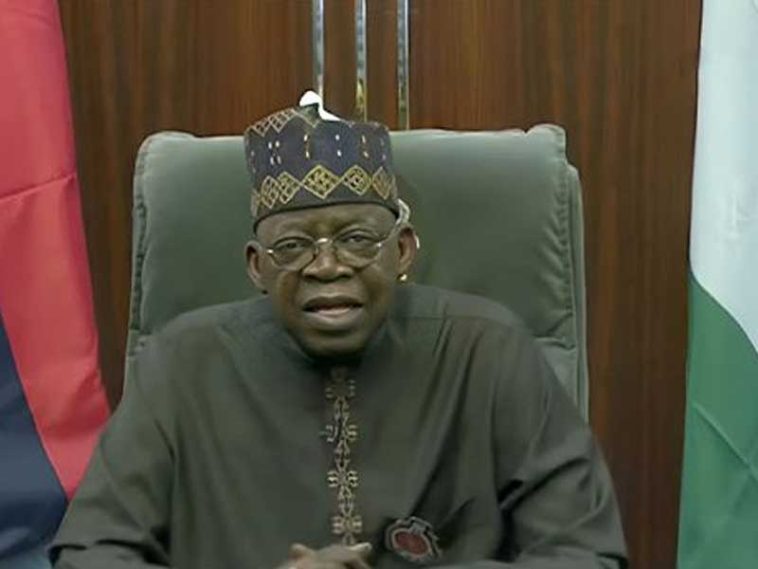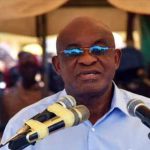By Abel Leonard
ABUJA – President Bola Ahmed Tinubu on Monday commissioned Loops 1, 2, 5, and 6 of the Greater Abuja Water Supply Network, reaffirming his administration’s commitment to delivering sustainable infrastructure aimed at improving the lives of Nigerians.
In a state House press release on Monday signed by Bayo Onanuga, Special Adviser to the president stated that the commissioning ceremony held along Airport Road in the Federal Capital Territory (FCT), the President also observed a moment of silence in honour of victims of recent violent attacks in Benue State, while expressing condolences to the affected families.
“While I sympathise with the people of Benue, I’ve spoken to the governor. The leadership of Benue should accept our condolences and try hard—very consciously—to maintain peace and harmony among themselves. We are a huge family living in the same house, staying in different rooms, but living together in harmony,” Tinubu said.
The President announced plans to visit Benue State on Wednesday to commiserate personally with victims of the attacks.
Turning his focus to the newly commissioned water infrastructure, Tinubu described the project as “a transformative effort to guarantee safe, sustainable, and sufficient water for homes, institutions, and communities across the capital city.”
“Water is life. It is not a luxury. It is a basic human right and a foundation for public health, urban development, and economic growth,” he said, adding that the Renewed Hope Agenda of his administration is anchored on delivering “tangible, people-focused projects that impact daily lives.”
The President praised the Federal Capital Territory Administration (FCTA), led by Minister Nyesom Wike, as well as international development partners, for their contributions to the project.
“This water infrastructure is not only a technical milestone, but a moral one, because it is about equity. It ensures that no part of Abuja is left behind in our national development agenda,” he stated.
Tinubu also thanked the Chinese Government and CGC Nigeria Limited for their collaboration on the project, noting: “We are showing the world that partnership built on mutual respect and shared prosperity can deliver real impact.”
He urged residents to take ownership of the infrastructure and use it responsibly. “As we commission this vital project, I urge all residents and stakeholders to protect this investment. Use the water wisely and work with the government to ensure sustainability.”
In his remarks, FCT Minister Nyesom Wike commended the President for his visible interest in developing the capital city, noting that the water project was one of the key concerns Tinubu raised upon assuming office.
“I recall that when you came on board, you invited me and asked, ‘Why is the mass transit train not working?’ and ‘What is happening to the Abuja water supply?’ You made it clear: ‘It’s not only rail infrastructure. We want the train to work and the water supplied to the city,’” Wike said.
Wike disclosed that the water project was initially awarded in 2017 for $470 million under a tripartite funding arrangement involving the Chinese Government (85%), the Federal Government, and the FCT Administration (15%).
He revealed that the FCTA has since signed additional agreements to expand access to rural communities.
“Last year, when you visited China—luckily for us, I was part of the delegation—the FCT also signed an agreement with CGC to provide water to rural areas. We are almost done with procurement to give water to Bwari, Kuje, Karu, and other communities,” Wike said.
The minister assured that future projects would be delivered within a shorter timeline. “It will not take years like this one. We believe that by next year, during your third anniversary, we’ll commission those satellite town projects where you provide water.”
Providing technical insights into the project, Acting Executive Secretary of the Federal Capital Development Authority (FCDA), Engr. Richard Yunana Dauda, said the new water loops are designed to serve 50 districts across the FCT’s Phases Two, Three, and Four, including the northern and southern corridors.
“Of the planned ten loops, Loops 3 and 4 are already operational. Loops 1, 2, 5, and 6 are part of the master plan and include additional pipeline networks,” Dauda explained.
He said the project involves the laying of 425 kilometres of ductile iron pipes, with 256 kilometres dedicated to main trunk lines and 169 kilometres for distribution lines. The system also includes 1,670 appurtenances such as valves and air release systems to ensure efficient water delivery.
“Upon completion, the project will significantly improve access to potable water for residents of Abuja,” Dauda added.
President Tinubu’s commissioning of the water network is part of a broader effort to upgrade Abuja’s critical infrastructure, with the administration promising to replicate similar initiatives across the country.






